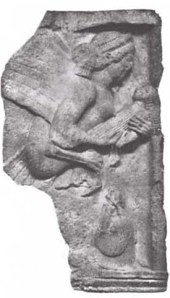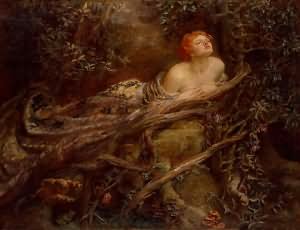
LYBIE and LAMIA
1. In Greek mythology Lybie was the mother of Lamia by Poseidon and as there are virtually no references to Lybie in classical literature it seem likely that Lamia, Lybie and the Lamiae are all variations of the same myth concerning the beautiful queen of Libya, daughter of Belus and Libya.

Lamia carring off a newborn babe
"Tomb of the Harpies", Acropolis of Xanthos, 6th century B.C
British Museum, London
From the 1911 Encyclopedia
LAMIA, in Greek mythology, queen of Libya. She was beloved by Zeus, and when Hera robbed her of her children out of jealousy, she killed every child she could get into her power. Hence Lamia came to mean a female bogey or demon, whose name was used by Greek mothers to frighten their children; from the Greek she passed into Roman demonology.
She was represented with a womans face and a serpents tail. She was also known as a sort of fiend, the prototype of the modern vampire, who in the form of a beautiful woman enticed young men to her embraces, in order that she might feed on their life and hearts blood. In this form she appears in Goethes Die Braut von Corinth, and Keatss Lamia.
The name Lamia is clearly the feminine form of Lamus, king of the Laestrygones. At some early period, or in some districts, Lamus and Lamia (both, according to some accounts, children of Poseidon) were worshipped as gods; but the names did not attain general currency.
Their history is remarkably like that of the malignant class of demons in Germanic and Celtic folk-lore. Both names occur in the geographical nomenclature of Greece and Asia Minor; and it is probable that the deities belong to that religion which spread from Asia Minor over Thrace into Greece.
2. A daughter of Poseidon, became by Zeus the mother of the Sibyl Herophile.
3. A female phantom, by which children were frightened. According to tradition, she was originally a Libyan queen, of great beauty and a daughter of Belus. She was beloved by Zeus, and Hera in her jealousy robbed her of her children. Lamia, from revenge and despair, robbed others of their children, and murdered them; and the savage cruelty in which she now indulged rendered her ugly, and her face became fearfully distorted. Zeus gave her the power of taking her eyes out of her head, and putting them in again.
Some ancients called her the mother of Scylla.
In later times Lamiae were conceived as handsome ghostly women, who by voluptuous artifices attracted young men in order to enjoy their fresh, youthful, and pure flesh and blood. They were thus in ancient times what the vampires are in modern legends.
In Jerome's Latin Bible Lilith is translated as lamia
According to Grolier's Encyclopedia, the Greek myth of Lamia is as follows:
Lamia was a beautiful woman whose children were taken away in jealousy by Hera because Zeus had loved her. In revenge, Lamia began to steal and kill the children of others. She became a hideous creature. Because Hera had condemned her to sleeplessness, Zeus gave Lamia the ability to remove her own eyes at will in order to sleep. In later legend the lamia was a vampire that seduced young men; this version of the story inspired the poem Lamia (1819) by John Keats. As indicated here, the myth of Lamia is also associated with a similar myth, that of "the lamia" or the "lamiae."
From The Anatomy of Melancholy, by Democritus Junior:
The celestial devils above, and aerial beneath, or, as some will, gods above, Semi-dei or half gods beneath, Lares, Heroes, Genii, which climb higher, if they lived well, as the Stoics held; but grovel on the ground as they were baser in their lives, nearer to the earth: and are Manes, Lemures, Lamiae, etc.
From The Book of the Thousand Nights and a Night, Volume 1, by Richard F. Burton:
"O my master, I wish to obey a call of nature": he therefore set her down at the ruin where she delayed so long that the King's son thought that she was only wasting time; so he followed her without her knowledge and behold, she was a Ghulah, a wicked Ogress, who was saying to her brood, "O my children, this day I bring you a fine fat youth"
The Ghúlah (feminine of Ghúl) is the Hebrew Lilith or Lilis; the classical Lamia; the Hindu Yogini and Dakini, the Chaldean Utug and Gigim (desert-demons) as opposed to the Mas (hill-demon) and Telal (who steal into towns); the Ogress of our tales and the Bala yaga (Granny-witch) of Russian folk-lore. Etymologically "Ghul" is a calamity, a panic fear; and the monster is evidently the embodied horror of the grave and the graveyard.
According to Bell's Women of Classical Mythology, the Greek myth of the Lamiae is as follows:
 Lamia, The Serpent
Woman Anna Lea Merritt
Lamia, The Serpent
Woman Anna Lea MerrittLamiae, obviously related to the persona of Lamia, the fearful child-snatcher, were handsome ghostly women who by various sensuous means lured young men to their beds.
There they enjoyed the fresh, youthful energy of their victims, then drank their blood and ate their flesh.
[ See: Lamia by John Keats ]
From Book Two of Ovid's Metamorphoses, 1567. The first translation into English by Arthur Golding:
The moysture was so dried up in Lybie land that time
That altogither drie and scorcht continueth yet that Clyme.
The Nymphes with haire about their eares bewayld their springs
and lakes.
Beotia for hir Dyrces losse great lamentation makes.
For Amimone Argos wept, and Corinth for the spring
Pyrene, at whose sacred streame the Muses usde to sing.
The Rivers further from the place were not in better case,
For Tanais in his deepest streame did boyle and steme apace,
Old Penew and Caycus of the countrie Teuthranie, ... [II.310]
From The Fardle of Facions by Johannes Boemus, 1555:
These Ethiopians or Indianes excepted, al the reste of the people of Libia Westward, are worshippers of Mahomet, and liue aftre the same sorte in maner, that the Barbariens do in Egipte at this present, and are called Maures, or Moores, as I thincke of their outleapes and wilde rowming. For that people was no lesse noysome to Lybie in those cursed tymes (when so greate mutacion of thinges happened, when peoples ware so chaunged, suche alteration of seruice, and religion broughte in, and so many newe names giuen vnto contries) then the Sarasens ware.
From The Eleven Comedies, by Aristophanes:
He has the right to say, "I am the first ever dared to go
straight for that beast with the sharp teeth and the terrible
eyes that flashed lambent fire like those of Cynna, surrounded by
a hundred lewd flatterers, who spittle-licked him to his heart's
content; it had a voice like a roaring torrent, the stench of a
seal, a foul Lamia's testicles and the rump of a camel."
